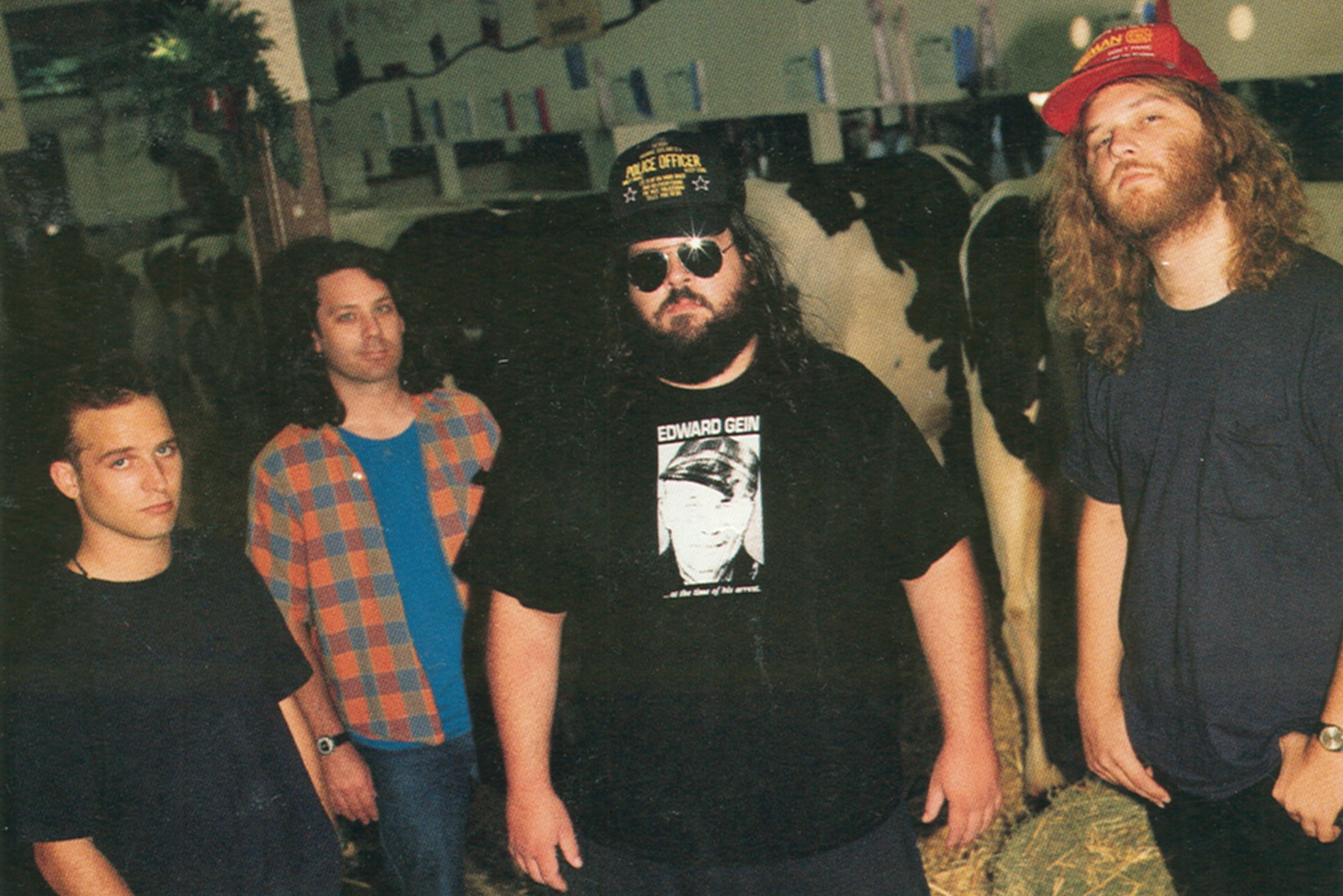This past summer, Lamb of God found themselves in the kind of situation metal bands usually write about – not deal with first hand. The band’s singer, Randy Blythe, was arrested on manslaughter charges in the Czech Republic, after he pushed a fan offstage, a fan who had repeatedly climbed onstage during a 2010 concert. The fan’s fall resulted in head injuries, and after falling into a coma, his death, and Blythe spent a month in a Czech jail before being released pending trial. With part of the ordeal now behind them, but with a question mark about their future hanging over the them, Lamb of God are back out on the road supporting their latest album Resolution, which debuted at number 3 on the Billboard charts, and which racked up some of the best reviews of the band’s 20-year career. For the latest edition of Tell Me About That Album, we chatted with the band’s bassist John Campbell, to talk about the record, the difficulty of this past year, and the secrets to keeping a band together for so long.How difficult is it to get back to work after such a horrendous few months? We’ve been doing this a lot longer than we’ve been dealing with the current situation so it’s very easy to get back on the road and get back to work. Some of it is still in the back of your mind, if not the front, and we’re just trying to move forward with a positive attitude and make the most of it.Are the crowds any tamer or more respectful of your space on stage this tour? One kid did run up and get on stage, which is not a very comfortable feeling. But it doesn’t seem different at all. It seems very much the same.Resolution seemed to push the band into slightly new directions, with “The Number Six” and “King Me” in particular, showcasing sounds we’ve not heard from you guys before. What’s more important, staying true to your roots or pushing yourselves in new directions? I think what happens is the writing just comes from the same well it always has. It’s just about trying to manipulate what comes out of there more effectively to push yourself beyond what you’ve done before. It should be known that I’m speaking to you as the guy that doesn’t create the riffs – that’s more of [guitarists] Mark and Willie’s department.But I assume you all have a say in what you like and what you work on and what seems like a Lamb of God song? Sure, but Mark and Willie are writing some pretty badass riffs so it’s not that hard.Does pleasing yourselves artistically come before giving the fans what they want then? When it comes to writing, we’re writing for ourselves. We’re writing stuff that we’re into and that we think is cool. It’s for us. It’s exciting that fans are into what we’re doing but doing something for the fans specifically is not really how we operate. That sounds kind of callous, but we don’t want to do the same thing over and over again.A lot of critics hailed this as your best record, which is rare for a band seven albums into their career. How does it rank in your mind amongst the rest of your catalog? Generally, my opinion is that what we’ve just done is our best. Definitely from the beginnings of the band to where we are now, we’ve progressed as players, writers and lyricists, and I think we continue to push ourselves to be better than we have been before.Do you feel like that every time you make a record, that each one is the better than the one before it? I do, although there have been records that I’ve walked away from thinking, “Wow, that really could have been better.” But they were still the best to that point because we started at the bottom. These last few records we’ve done, I’ve walked away feeling very proud and excited about what we’d done and I truly believe that that is the best thing that we’ve done up to that point.Can you talk about how you arrived at the album’s title? Why Resolution? We came to that title through a ton of arguing through emails and throwing around different proper nouns. What I ultimately liked about the title is that it doesn’t mean just one thing. It could mean resolution, that it’s an ending. It could mean resolution as far as having the will to push forward. The image on the cover is a resolution of sorts of whatever that burning ash of wreckage in the distance is. But I like that it’s open to interpretation. Any art that’s worthwhile is inclusive of the person taking it in on the other end.Do you guys usually agree on titles? What’s the process like? It’s not very glamorous. It’s usually a list that we all compile together and then we start crossing off the stuff that people can’t stand and then it can even come down to a vote.You touched on it briefly, but what was the concept behind the cover art? That came up through some discussions with Mark Morton and Ken Adams, the guy who’s done all of our cover art. We had the idea of this barren wasteland with this burning mass in the back. We thought it’d tie in with some of the lyrical themes.What are the secrets to keeping a band together across two decades – and with pretty much the same lineup intact? Coping mechanisms, healthy or otherwise [laughs]. You have to love what you’re doing when you’re on stage. I think that we all share the love of getting on stage and performing. It’s an incredible thing that we get to do.So regardless of what happens between you guys you’re all able to get past it and remember how much you love playing shows together? I’m speaking in general terms about a real complicated situation but we all love what we do. We have a common goal and I think we all realize together we do something that’s pretty incredible.It’s nice that you guys are able to keep sight of that. We never intended to make it or be a success outside of playing in Florida and kicking ass. And the success that we did see didn’t come until later in life so I think we were a little more grounded than people who are 20 and out there really trying to succeed and who maybe catch a lucky break early.
More Stories From This Author
Capitol Hill Block Party Artist Panel Series 2019
The Capitol Hill Block Party Artist Panel Series 2019 is free (no festival wristband required), all-ages, and takes place from…
Golden Idols will release new EP
Seattle quartet returns with ‘Uneasy’
Travis Thompson, Wolf Parade headline Fisherman’s Village fest
The Everett Music Initiative festival, May 16-18 in Everett, will showcase more than 50 acts.







